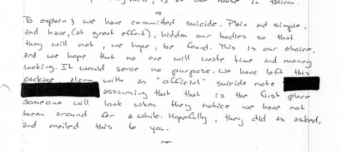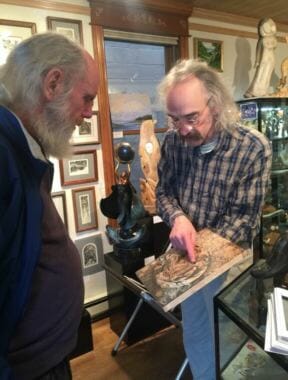
Eric Bealer, a renowned Southeast Alaska wood block artist, was expected back from his remote summer cabin by the end of September along with his wife, Pam.
By early October, no one had heard from them. So two friends went out to the cabin, on the outer coast of Yakobi Island.
The friends left by boat from Pelican, a tiny fishing village where the Bealers lived the rest of the year. When they arrived at the cabin, there was no sign of the Bealers – just a box, and a note taped to the window on the front door.
“To the world and all concerned: This is to officially notify you that Eric and Pam Bealer, by their own choice and free will, have committed suicide,” it said, according to an Alaska State Troopers report. “We have gone to some effort to hide our bodies, as we do not want them found. Please do not waste time and money looking. It would serve no purpose. We are gone, leave us to our peace. (And yes, we have taken the dog with us…)(Oh, and we set the chickens free!)”

The Bealers were both 58, born a day apart. They haven’t been seen since September, when they arrived at their cabin from Pelican.
Their apparent deaths have sent ripples of shock and grief through the people who knew them in Southeast Alaska and beyond. State troopers and the courts, meanwhile, are now trying to sort out the details of what the Bealers did, and what they left behind.
Since the note’s discovery, friends have held memorials for the couple; boxes and letters they left for people close to them have been mailed. But the Bealers still have not been declared dead: A “presumptive death” petition is pending in Sitka District Court before Magistrate Judge Amanda Browning.
In nearly identical, handwritten wills, the Bealers left their artwork to Eugene Solovyov, who runs a Sitka gallery. The rest of their property – including their money, boats hand-built by Eric Bealer and their home and land in Pelican – was set aside for a wilderness fund run by the Sitka Conservation Society.
“So that they may continue to help protect this land that I so love,” Eric Bealer’s will said. His wife’s had one extra word, “to help and protect.”
Eric Bealer was known for his distinctive wood engravings depicting wilderness scenes in the Tongass National Forest. He made posters for several years advertising Juneau’s Alaska Folk Festival.

The intricate engraving form requires artists to cut away the surface of a wood block, leaving a design that gets inked and run through a hand-operated printing press.
Bealer’s prints typically cost less than $100 and usually reflected the rugged landscape of his home – its oceans, forests and animals along with the occasional person or boat. Some contained wry hints at a human presence, Solovyov said.
“He would show a particular scene but then add his own imaginary elements to it,” he said. Bealer, he added, was the gallery’s best-selling artist, popular among both tourists and locals.
Eric Bealer was born in Pennsylvania, and moved to Alaska in 1989, first settling in a different Southeast town, Haines.
He and Pam then relocated to Pelican and were living four miles outside the tiny fishing town, in an even tinier settlement. Friends described them as self-reliant naturalists: For a while, they owned a horse and kept sheep for the wool. They also raised chickens and gardened, fertilizing with manure and seaweed.
Eric built boats out of locally harvested cedar and spruce; Pam knitted and wove and made clothing. They would periodically ship Eric’s artwork to Sitka and elsewhere in Southeast Alaska by seaplane.
“They complemented each other extremely well,” Solovyov said.
But Pam Bealer had multiple sclerosis, and her health was slowly deteriorating, according to accounts that friends and family gave the troopers. But those close to them had different impressions of how bad things were, and of the Bealers’ plans.
Solovyov said Eric Bealer had talked “for years” about how the couple planned to kill themselves when Pam’s health became unmanageable.
“We all tried to talk him out of it,” Solovyov said. “We were just hoping that it wouldn’t be happening quite yet.”

Some friends gave similar reports to the troopers. One, a financial planner, noted that the Bealers had asked him a series of questions about their wills in May. But he thought that was more about the fact that the Bealers lived and traveled in a harsh environment, and knew the risks involved.
Others said the Bealers’ disappearance came as a complete surprise.
“We didn’t pick up on anything that they were planning on committing suicide,” Avery Simmons, the friend who found the note at the Bealers’ cabin, told state troopers.
The troopers searched both of the Bealers’ properties – their home near Pelican and their cabin on Yakobi Island. They also flew a plane around the harbor next to the cabin.
“I did not locate any sign of Pamela or Eric from the air or on the ground,” wrote trooper Branden Forst, who flew the plane.
The search for the Bealers has been formally suspended, said Jonathon Taylor, a troopers spokesman.
“We have not found any evidence or indication as to where they might be,” he said. “And given the very clear nature of the notes that were left behind, it seemed apparent that we might not actually be able to find them.”
If you or someone you know is thinking about suicide or hurting yourself, call the Careline at 877-266-HELP or seek help from a medical professional.
